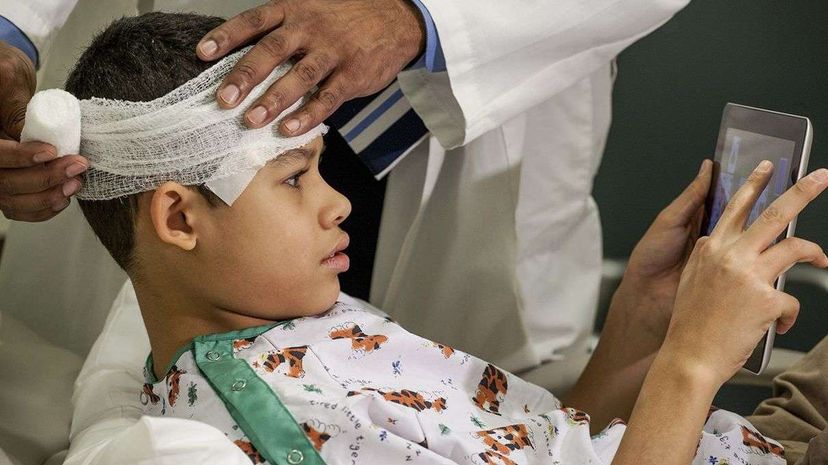
If you have a smartphone, you've probably noticed that thing can be completely captivating. In fact, it's not hard to draw parallels between the way we interact with our pocket computers and the way an addict seeks out their drug of choice. There's something that keeps you compulsively diddling around on your smartphone or tablet long after you've taken care of the business that made you pick it up in the first place. In fact, medical researchers are trying to figure out how to use the level of engagement achieved by playing "Angry Birds" to replace medications used to manage anxiety and pain in a hospital setting.
New research presented at this week's annual World Congress of Anaesthesiologists (WCA) in Hong Kong reports that in children, distraction with an interactive device like a smartphones and tablets can actually replace sedative medication used to reduce anxiety before undergoing general anesthesia for surgery. The study also shows that the anxiety of parents drops when their child is distracted by a tablet. (Or clowns. You could always use clowns.)
Advertisement
"We are not completely surprised by our results," says study author Dr. Dominique Chassard, of Hôpital Femme Mère Enfant, Hospices Civils de Lyon in Bron, France via email. "All forms of distraction work to decrease anxiety, and movies and videos have shown to be effective for anxiety reduction in children. At this time tablets are very familiar for children and thus the best way to distract a child's attention far from medical environment."
The researchers looked at 112 outpatient surgeries of children ranging from 4 to 10 years old, and compared the pre-and post-surgery efficacy of managing anxiety in the patient (and their parents) by administering a sedative called midazolam, with that of handing them an Apple iPad loaded with games like Pet Salon, Monster Dash, and Talking Tom. Both children and parents in the group in which the patient got the iPad reported much lower anxiety and higher satisfaction with the anesthesia procedure in general than the group that got the midazolam.
Midazolam blunts preoperative anxiety, says Chassard, but one negative side effect is that children have no memory of what happened to them.
"This can induce some confusion during the postoperative course, with frequent agitation and nightmares," she says.
This situation is not ideal, obviously. Making kids comfortable in a medical setting is on the top of a doctor's list these days, but that wasn't always the case.
"Fifty years ago, pediatricians believed children's brains weren't developed enough to feel pain," says Dr. Lisa McQueen, a pediatric emergency physician and Program Director at the Pediatric Residency Training Program at the Comer Children's Hospital in Chicago, "and made all sorts of excuses for why they shouldn't be treating their pain and anxiety — it was completely barbaric."
Since that time, however, pediatricians have realized hospitals are extremely stressful and anxiety-inducing places for kids and parents alike, and they've tried all sorts of distraction methods, from blowing bubbles to bringing in clowns to having nurses and psychologists coach the child through the procedure.
"We see kids every day who are hurt and require us to do something that freaks them out," says McQueen. "When tablets and smartphones started becoming kind of ubiquitous, I found in my own children that there's a level of engagement that allows you to be fully drawn in a way blowing bubbles and clowns and things don't."
McQueen's emergency department started using iPads a few years ago, and though they had a feeling mobile devices were probably superior to other distraction techniques and sedatives, McQueen created a study to test it.
"We found it just works better," she says. "It keeps the kid more relaxed and calm, but it's also just better medicine — the patients and their families are more relaxed. It's better because the child isn't as freaked out the next time they need to see a doctor. It also uses less resources in the room — if you're putting stitches in somebody and they're freaking out and require three people to hold them down, it's unpleasant for everybody, but it's also three other people who can't be caring for other patients. It's just a great investment for the emergency department."
It's great and everything that tablets work as well as sedatives for kids who are experiencing anxiety before or during a medical procedure, but what about for adults?
"Honestly, in cognitively normal adults, in a medical setting we just tell them to suck it up, right?" McQueen laughs. "But I wonder if the dentists have looked at it! There's a lot of dental anxiety out there."
Something to think about next time you schedule a filling.
Advertisement

